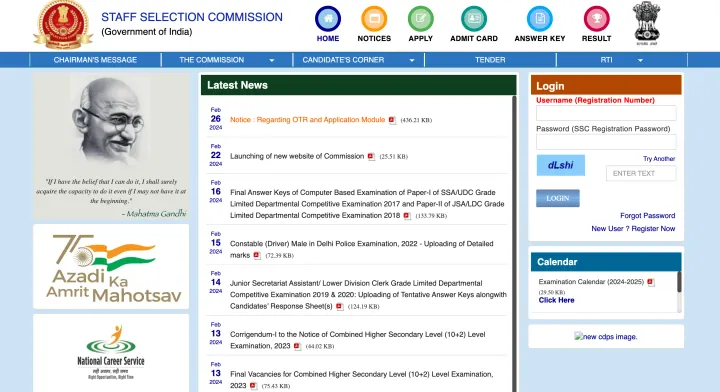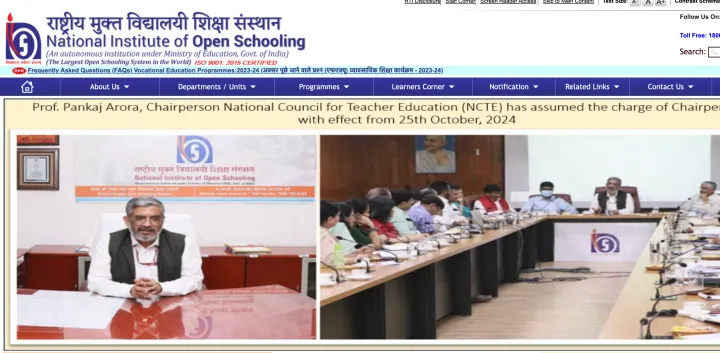Nature and functioning of UPSC and its exams
Here we have shared the nature and functioning of UPSC and various exams that fall under the UPSC examination and other details that can help

The Union Public Service Commission (UPSC) is a prestigious organization in India. Make it distinctive in one sentence. It is in charge of holding several tests to find candidates for coveted government jobs like the civil service. The nature, operation, and examinations of the UPSC significantly impact how the nation's government and bureaucracy are organized.
What is UPSC?

The Union Public Service Commission, commonly known as UPSC, is an independent constitutional body. It is established under Article 315 of the Constitution of India. It serves as the primary agency responsible for recruiting civil servants for the various services and posts in the central government.
The UPSC conducts prestigious examinations. This includes the Civil Services Examination, Engineering Services Examination, Combined Defense Services Examination, and many more.
The Significance of UPSC Exams

UPSC exams serve as the gateway to prestigious careers in civil services. It also offers an opportunity to contribute to the nation's development. The selected candidates are vital in policymaking, administration, and governance. Serving in these positions allows individuals to impact society and shape the nation's future positively.
Constitutional Provisions for Union Public Service Commission:

- Article 315: The Union Public Service Commission (UPSC) is established by Article 315 of the Constitution of India. It is a constitutional body responsible for conducting examinations and making appointments to various Union civil services.
- Independence and Impartiality: The UPSC is designed to be an independent and impartial body. It functions autonomously, free from any external influence or interference, ensuring a fair and transparent selection process for appointments to the civil services.
- Composition: The UPSC consists of a chairman and other members appointed by the President of India. The President appoints the chairman and members after consulting with the Governor of the concerned state, if necessary. The members of the UPSC keep their positions for a particular time or until they turn 65, whichever comes first.
- Functions and Powers: Exams, including the Civil Services Examination, Engineering Services Examination, and Combined Defence Services Examination, among others, are administered by the Union Public Service Commission (UPSC). It also conducts interviews, makes appointments to various civil services, and advises the government on matters relating to personnel management, etc.
- Recruitment and Selection: The UPSC plays a crucial role in recruiting and selecting candidates for the civil services. It conducts a rigorous examination process that includes multiple stages. This includes a preliminary examination (prelims), a main examination (mains), and, at the end, an interview. The selection process aims to identify candidates with the necessary knowledge, skills, and aptitude to serve in the civil services.
- Autonomy and Accountability: While the UPSC enjoys autonomy in its functioning, it is also accountable to the President and the Parliament of India. The annual reports of the UPSC are submitted to the President and laid before both houses of Parliament. This ensures transparency, accountability, and scrutiny of the Commission's activities.
The Role of UPSC in the Civil Services Selection Process

- Formulating Examination Policies and Procedures: The UPSC is responsible for formulating examination policies, including the design, structure, and syllabus of the civil services examination. It conducts a comprehensive analysis of the evolving administrative services needs and revises the examination pattern and syllabus accordingly. This ensures that the investigation remains relevant and in line with the changing governance and public administration dynamics.
- Conducting Examinations: The UPSC conducts a series of examinations at different stages. This helps to select candidates for various administrative positions. These examinations assess the candidates' intellectual capabilities, analytical skills, decision-making abilities, and understanding of multiple subjects. The examinations are conducted fairly and transparently, strictly adhering to rules and regulations.
- Interview and Personality Assessment: The interview stage is critical in the civil services selection process. The UPSC conducts interviews to evaluate the candidates' personality traits. This also includes communication skills, leadership qualities, and overall suitability for administrative roles of the candidate. The interview panel comprises experts from various fields who assess the candidates based on predetermined criteria, ensuring fairness and impartiality.
- Maintaining a Robust Evaluation System: The UPSC evaluates answer sheets and interview performance. The commission follows a standardized and transparent evaluation system to ensure all candidates are assessed equally. Qualified and experienced evaluators meticulously review the answer sheets, and the final selection is based on a candidate's overall performance in all stages of the examination.
Key Departments in UPSC

UPSC encompasses several departments, each with its own set of responsibilities. Here are some of the key departments within UPSC:
- Examination Department: This department is responsible for conducting examinations, including the Civil Services Examination, Engineering Service Examination, Indian Forest Service Examination, and others. It handles all aspects related to examination scheduling, question paper setting, evaluation, and result declaration.
- Recruitment Department: The Recruitment Department focuses on recruiting candidates selected through UPSC examinations. It handles the formulation of selection criteria, verification of documents, and appointment procedures.
- Administration Department: The Administration Department oversees the administrative functions of UPSC. It deals with matters related to human resources, financial management, infrastructure, and general administration to ensure the smooth functioning of the commission.
- Policy and Research Department: This department is responsible for formulating policies, guidelines, and procedures related to the functioning of UPSC. It conducts research
The UPSC Examination Process

The UPSC examination has a comprehensive and rigorous process. It consists of several stages of selecting and recruiting a candidate. This includes the Civil Services Preliminary Examination (prelims), the Civil Services Main Examination (mains), and the Personality Test (Interview). Let's explore each stage in detail.
Civil Services Preliminary Examination:

The initial round of the selection procedure for civil service is the Civil Services Preliminary Examination. The Civil Services Aptitude Test (CSAT) is another name for it. This test evaluates a candidate's general knowledge, aptitude, and analytical skills. The General Studies Paper-I and General Studies Paper-II (CSAT) are the two papers that make up the CSAT. Both exams have multiple-choice questions and are objective.
Civil Services Main Examination:

Candidates who qualify in the Preliminary Examination (prelims) move on to the next process. That is the Civil Services Main Examination. It consists of a written examination. And they were then followed by a personality test. The written examination comprises nine papers, out of which two are qualifying in nature, while the rest are counted for merit.
UPSC Written Examination details and process:

The nine papers in the written examination are as follows:
- Paper-A: One of the Indian languages (Qualifying)
- Paper-B: English (Qualifying)
- Paper-I: Essay
- Paper-II: General Studies-I
- Paper-III: General Studies-II
- Paper-IV: General Studies-III
- Paper-V: General Studies-IV
- Paper-VI: Optional Subject - Paper 1
- Paper-VII: Optional Subject - Paper 2
- Personality Test (Interview)
Those applicants who pass the written test are contacted for an interview and personality test. Based on the candidate's personality qualities, communication abilities, and general skills, the interview aims to determine the candidate's suitability for various civil service positions.
The Decision

Candidates are chosen based on their performance in the Civil Services Main Examination and the personality test (interview). The candidates' rank and distribution of services is determined by adding the marks received in the Main Examination and the interview.
Evaluation Criteria of the UPSC Examination

The evaluation process of the UPSC examination follows a meticulous and transparent approach. Here are the key evaluation criteria considered by UPSC:
- Subject Knowledge: The examination evaluates candidates' depth and breadth of knowledge in various subjects. It focuses on their understanding of concepts, principles, and their application in real-world scenarios.
- Critical Thinking: The ability to think critically and analyze situations is essential for administrative roles. UPSC assesses candidates' critical thinking skills through the examination. This evaluates their capacity to make sound judgments and decisions.
- Clarity of Expression: Effective communication is crucial in civil services. UPSC evaluates candidates' clarity of expression, coherence in presenting ideas, and ability to communicate concisely and persuasively.
- Ethical Understanding: The UPSC examination emphasises candidates' ethical understanding and integrity. It assesses their awareness of ethical dilemmas and capacity to make ethical choices in administrative roles.
Conclusion
The nature and functioning of the UPSC and its exams are geared towards selecting competent individuals who can contribute to the nation's governance and development. With its transparent and rigorous evaluation process, the UPSC ensures that only the most deserving candidates are chosen for the esteemed civil service positions.
Aspirants preparing for the UPSC exams should be equipped with the necessary knowledge, dedication, and perseverance to excel in these highly competitive examinations, as they offer a gateway to a fulfilling career committed to serving the nation and its people.
For complete details, we recommend you visit UPSC's official website.
Also read the following:
The most effective apps and websites for UPSC preparation.
How to prepare for the UPSC exam.
12 Books that allow you to shape your career.
Share and subscribe to the blog by email.




Comments ()